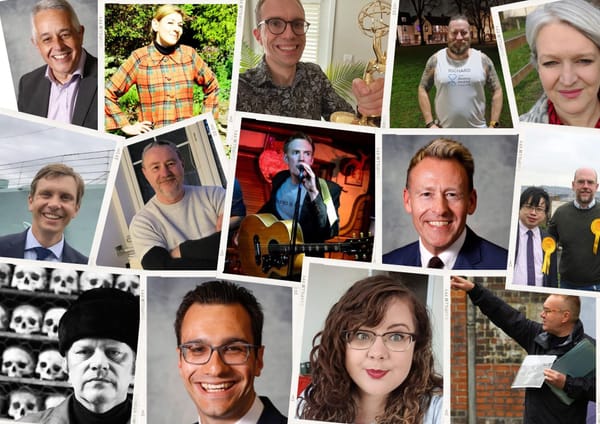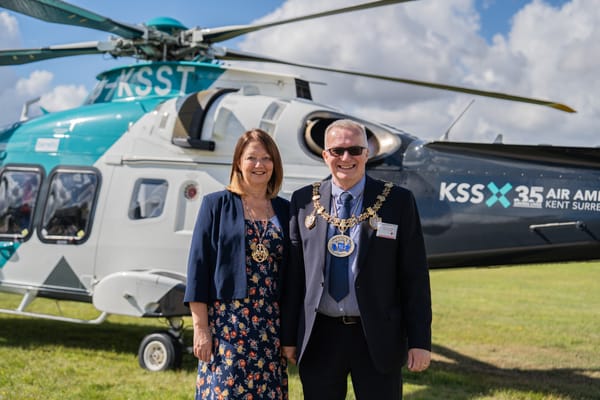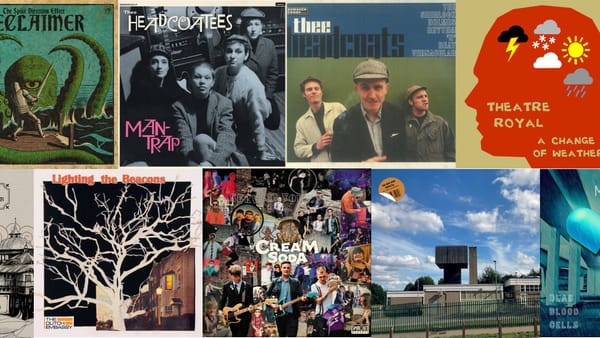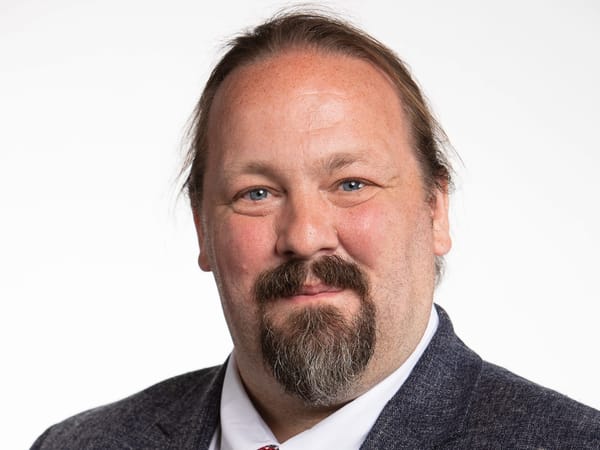"I feel it is my primary role to promote Medway"
What Steven asked Nina Gurung, current Mayor of Medway.
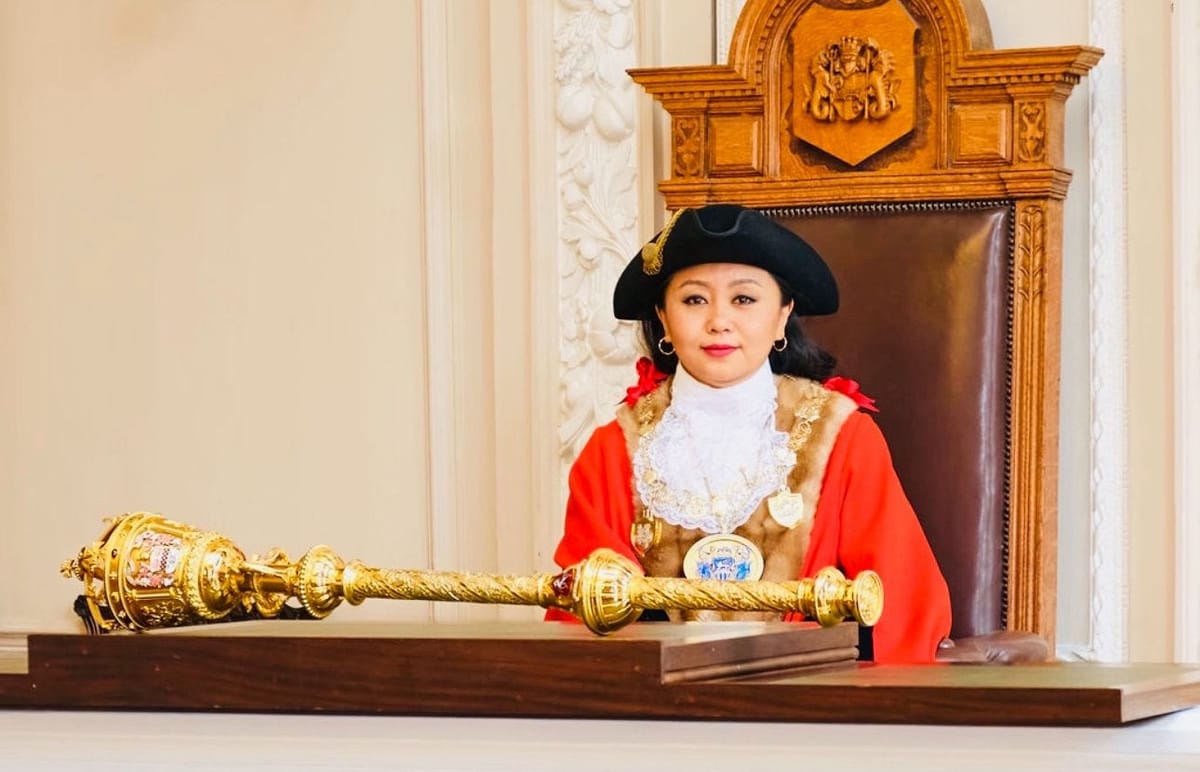
Editor’s note: Usually our interviews cut off roughly halfway through, so free subscribers get a taste of the conversation, but only paid subscribers receive the full thing. For this final interview of the year, we’re dropping the paywall altogether, so all subscribers are receiving our full conversation with the Mayor of Medway, as well as her Christmas message. While this particular edition is free for all, if you’d like to receive our full interviews going into 2024, please consider becoming a paid supporter. It costs £5 per month or £50 for a whole year.
In what might become a new Christmas tradition, Steven sat down with the Mayor of Medway to discuss what brought them to the role, the charities they support and what they do as the Mayor.

Firstly though, our first Christmas message from the Mayor of Medway:
Our home area, the Unitary Authority of Medway, is uniquely beautiful, highly promising, united, and strong.
Since being elected as the Mayor, I’ve had the wonderful privilege of meeting so many of you and have been deeply touched by the hugely inspiring examples of kindness, positivity, and community spirit from individuals of all ages, abilities and backgrounds, community groups, charities, education, training, employment, statutory service providers, creative sectors, social groups and even businesses and conglomerates.
In terms of giving back and working together at all levels for the benefit of the local community, I’ve seen first-hand that Medway truly tops the list, and this should make us all incredibly proud; through our deeds and words, we are teaching our younger generation to be kind, thoughtful and magnanimous, the most priceless gifts of them all as humans.
As we head into the festive season, I would like to wish everyone in Medway the most joyous Christmas, filled with love, peace, harmony, and happiness. May 2024 bring us all good health, joy, success, and prosperity.
To all our friends from across the UK and around the world, come and discover our wonderful Borough rich in heritage, culture, creativity, free festivals, and warm-hearted people! On behalf of all the wonderful people of Medway, I Wish You a Very Merry Christmas and a Happy, Peaceful New Year!!
And now for our interview.
Where were you born?
I was born in Hong Kong, where my dad was in the British Army stationed in Hong Kong.
What brought you to the UK?
I came to the UK as an army wife because my husband is a Gurkha with the Queens Gurkha Engineers, stationed in Maidstone Invicta Park barracks.
How did you end up in the Medway Towns?
After my husband retired from the Queens Gurkha Engineers, he rejoined the army with the Military Provost Staff service and was stationed here at Brompton. That job brought me and my family to Brompton, and we've lived in Brompton ever since.
What is a Gurkha?
A Gurkha is a soldier that are recruited from Nepal. They are legendary for their bravery and courage, as well as their loyalty and kindness. The Gurkha ties with the British army go back over 200 years. There have been 13 Victoria Cross winners from the Gurkha regiment.
Did your father have a specialism in the army?
No, he was with the sixth Royal Gurkha Rifles, a soldier.
How did you find school?
Because my father was with the British Army and my mum had three kids to look after, me and my brother were put in a boarding school in Kathmandu, Nepal from a very young age. So school was missing mum and dad, missing family, but also making lots of friends.
Were you good academically?
My teachers used to describe me as bright, and they used to say ‘Nina, if you put a little bit more effort, the sky’s the limit, but English was always my favourite.’
Where did you go to university?
I went to college in Nepal, but I wasn’t able to finish as I did get married quite early. I went to university after coming to the UK. I did a Bachelor’s in Social Work.
And you did an MA?
I did my social work practice, and after that, I went back and did my Masters in International Social Work policy.
Was there a particular focus of the MA?
I’m sure people have heard of the Gurkha Justice campaign, that was spearheaded by Dame Joanna Lumley. Back then I used to run a popular website called Gurkhas.com, and it was well known amongst the Gurkha Nepalese community across the world. I’m sure it was well-known by the MOD (Ministry of Defence) as well (laughs).
Anyway, after the Gurkha Justice campaign was successful in convincing the government to allow more retired Gurkhas to come and settle in the UK because of their ties with friends and families, they settled in different pockets of communities across different parts of UK, particularly where there were military towns and army communities. However, it seemed that the locals were all of a sudden seeing a lot of Gurkhas in their towns, not knowing what else was being done by the government to support the infrastructure, GPs, and schools etc. There was a general sense of alarm, but it was not helped by leaders at that time. What I did notice, I was working in my social work and part of the work was to see what is the gap for the Gurkhas, because that was my forte at that moment. Every day it used to be quite alarming news about how Gurkhas were taking over their houses. There was a lot of xenophobia being found by unhelpful articles and my perception was Gurkhas after coming here, as much as possible, they wanted to be self-reliant and wanted to give back, and not wanting to take up NHS because they believe in doing the morning walks and keeping themselves fit and healthy. I wanted to find out what the reality was, and I wanted to find out if my view was skewed or whether what was being reported was not reality.
That prompted me to start that research, which was mainly focused on the settlement and integration process of the UK. It is seminal research and when the research findings came out, it was widely reported through the BBC and ITV Southeast, also in those regions where the tensions were rising. It immediately almost helped calm people down, because it showed with evidence that contrary to the belief, the Gurkhas were actually giving back multi-fold and when you look at the research findings, it was proved beyond all reasonable doubt that Gurkhas were the most socially active community group at that time. It was a minority population of older retired Gurkhas above 65, who were being housed by the local housing associations, but back then the numbers were minimal, compared to the people actually owning their own homes. It was so influential that at that time, we had got a call from the DCLG (the then Department for Communities and Local Government) to deliver the findings, and there was also effort from different parts of the communities leaders, to say ‘look it's understandable that the locals are a little bit concerned, but we need those infrastructures and we need funding to build up those infrastructures for GPs, to have interpreters etc.’
So, funding was released, a massive £1.5m to various local authorities, where there were larger communities and it all settled down. The University of Kent established a five-year scholarship for Gurkhas and their dependants, who were injured in war or had lost their lives. I must admit when I did the research because I had to give up my work to focus on the MA and research, I did get funding from SESPM (South East Strategic Partnership for Migration).
How many languages can you speak?
I can speak fluent Hindi, Nepalese, English, and I also speak the ethnic language Gurung. I have some understanding of Cantonese as well.
What political parties have you been a member of?
Only Labour.
When did you join the Labour Party?
After covid.
Was there a particular reason why you joined?
Being a social worker, you are very much in tune with what's happening on the ground level, with regard to vulnerable children and families. I became disillusioned with some of the support systems that should have been there, in my perception, to protect the most vulnerable in our community. The situation was becoming more and more dire, and being a social worker gives you the understanding as to what is actually happening on the ground.
When did your name first appear on a ballot?
It was the last local election.
What was your first full-time job?
I was still at college back in Nepal. It wasn't full-time, but I used to work with street children in Kathmandu. In Nepal we don't have child protection, so I used to try to do some educational work. We didn't have the means to provide them a roof over their head, but they could come to evening classes so that they got skills and some education. The hope was that they would come off the streets get some like vocational employment, and then try to build their lives. Full-time work, I did go to Hong Kong, to support my brother’s education and I worked in Hong Kong as an interpreter because at that time a lot of Nepalese Gurkha’s children in particular, who were born in Hong Kong, were allowed residency and a lot of them went to Hong Kong, but there was also lots of involvement in petty crimes. There was a real need for interpreters and the judiciary would accept English, and because I spoke Nepalese and English, I was able to support the judiciary as well as the police with the investigation as well.
What is your official occupation?
At the moment I work as an assistant manager and Safeguarding Lead in Fostering. I did come out of statutory work to join this agency before I started the political journey.
What additional roles, paid or unpaid, do you do?
Councillor and Mayor of Medway, which I'm very proud of. Also, a trustee of the Buddhist Community Centre in the UK and Diamond Buddhist community in the UK, and two local charities, Second Chance Medway1 and the All-Saints Community Project Trust. I am also an active member of Brompton PACT (Police and Communities Together).
What does the average day entail?
Getting up very early and if I haven't done any updates on my social media about what the Mayor's been up to, I do that, and then I get ready for the day ahead by checking my various inboxes. One is a personal one, and one deals with Labour updates, and then the mayoralty inbox, making sure that the mayoralty team are fully following up what we should be following up and planning ahead, responding to inquiries, and so preparing as a team. The weekly diary goes up on Fridays and before that we need to make sure everything is up to date, ensuring things are in place in terms of questionnaires, and then my work inbox, which can be very heavy flowing as well.
I do have some flexibility at work. I've cut down my hours because there's no way you can do the Mayor's role whilst working full-time. My employers have been great. They allow me flexibility. Sometimes the Mayor’s visits can be quite brief, so I don't need to necessarily take the whole day off, so I go to those events and then go back to work or I go to work and go to those events. What I would say to working-class aspiring leaders and Mayors is you can combine work with mayoralty, but you do need understanding employers. Most of the Mayor's work happens in the evenings or the weekends and you are able to separate work from mayoral duties, but you do have to be very committed in putting in extra hours. if you want to become a good mayor, to do your research, so that you are able to pay proper tribute and respect to the people that invite you and generally they invite the mayor because good things are happening in communities and they just want the volunteers and the organisers to get that extra support and recognition. To do that properly you need to do your research, and make sure that by the time you meet them, they feel immensely happy that you already read everything about the journey what they've been through, their challenges and where they are today. I think that can really bring out the best of the event.
How did you become Mayor?
This was completely new territory for me. After the election win, we started hearing we needed to choose the mayor, and I started getting text messages saying can you consider me or can you consider somebody else. We would be talking to some of my close colleagues and I started getting messages from others asking ‘Why don't you go forward, we want you to go forward.’ I thought I'm working full time, I may not be able to do that, I don't know what it entails fully, because people's expectations might be really high. There was an application where you gave an expression of interest and then there was balloting, and so I got nominated and then we went to full council and then elected.
What specific charities are you supporting as mayor?
I've chosen 3 charities in particular. One is Soldiers, Sailors, Airmen and Families Association (SSAFA). I know a lot of good work that SSAFA does for the tri-service, veterans or serving and their families. The Medway Towns are very proud of our military heritage as well, I just wanted a charity that is representative of the tri- service. The second one is Medway Help for Ukrainians. In the short period of them being established, they're an award-winning charity for the right reasons because they have enabled so many families to not only be part of the Medway tapestry, but it's empowering them to give back as well. In a way I find a little bit of similarity in their ethics as the Gurkhas because they want to be self-sufficient and want to give back. They're a proud community as well in that respect, but there was that need for support, and enabling them and their children to get integrated properly in Medway. Finally, we have Young Medway, which is a relatively new CIC (Community Interest Company), but what they're aiming to do is encouraging and much needed, because we have seen a lot of good youth work being done. It is very much about sharing good practice and learning from each other and supporting each other and utilising that valuable experience and skills within the youth charity sectors to work collaboratively. Young Medway is trying to do that with the youth sector.
What does the Mayor do?
The Mayor of Medway is a representative of the crown, the first citizen of Medway. To each Mayor, I give due credit to how they have utilised their tenure. For me, it has been very clear from the outset that no matter which side of the political spectrum you've come from, if you're doing really good work for Medway, I will value that and I will support and elevate that. You can be from the private sector, voluntary sector, from the statutory sector, across all different sectors and all backgrounds and all ages, the Mayor is there to support, encourage and promote acceptance, inclusivity and make everybody feel that they belong, and they have something to give. I didn't realise how much good work is happening across Medway and how many volunteers and good people there are across Medway, giving back endlessly, and we need to celebrate that, and I have taken it upon myself to really elevate that. We have the kindest people, because kindness means you are not only happy in yourself, but you want to give to others. It's overflowing. That's how rich we are in that we've got the history, we've got the modernity, and we're very rich in terms of community spirit.
I have been welcomed and honestly, it has been such a generous and warm welcome by all people throughout Medway and I'm so grateful for that. I absolutely feel so grateful that I feel I must give back and I'm trying my best. I never used to go on social media before apart from using my Gurkhas.com website and I did have a Facebook page for that, but I didn't have any personal accounts on any social media, but being the Mayor, I have opened up a Twitter account. Some of the postings that I've done have gone outside of Medway and some of the followers include Lords from the House of Lords, and the previous Chief Engineer of the Royal Engineers and very influential people, which goes to show that actually people are inspired by what's happening in Medway. So, flagging up not just internally what's happening here, but celebrating that and making sure people outside recognise the community spirit in Medway, the positivity in Medway, the kindness in Medway and the good practises that are happening here. The celebrations and the festivals we have here, which in most areas they might have to pay for, but here it's free, and our green spaces and honestly there's so much to celebrate about here in Medway and that I feel is my primary role to promote Medway.
You mentioned how the Mayor is the first citizen of Medway. It also comes with the titles Constable of the Castle and Admiral of the River. Do you have any role there or are they just titles?
They are honorary titles. One thing that is happening in Medway is the Admiral’s river cruise. It happens every year and I believe none of the Medway residents are aware of it. Neither was I until I became the Mayor, but I really hope that in the coming years it's going to be something that children and young people and Medway residents will celebrate together. Because the Mayor of Medway is also the Admiral of the River Medway, the Rochester Cruising Club on a yearly basis, recruit volunteers who have got yachts and vessels, and they have a flotilla of about 60-100 vessels that goes all the way to Sheerness and all the way to Maidstone. It happens across two days and every boat can have a guest each, so it can be the civic guests or the councillors, previous Mayors, hosted by the vessel owners. We go to the different corners of our border to pay respects to lives lost at sea. This is our area of the river, and we pay our respects to all the live slots across the region of our river, and it is a beautiful event.
We have so many castles and forts, so as we go to different parts of the river, say past Upnor Castle, the bugle gets played and then you have the firing of the cannon. I'm just hoping that in days to come, children can go to the Strand and wave to the flotilla, and this is part of our history. With regards to the castle, it is an iconic castle as you know and it is where some of the most iconic events are taking place, like the amazing Pride event and where else to drape that flag to make that statement. I think as the Constable of the Castle, I can still lock up somebody for up to 28 days in the castle. Which I’m not going to do…
Footnotes
This interview has been lightly edited for length and clarity.
You can read our previous interviews here, including our interview with the Leader of Medway Council Vince Maple.
If you have lived or worked in Medway and are planning an event or launch in 2024, or celebrating a significant anniversary and would be happy to talk about it here, please email Steven.
If you want to suggest ideas or send tips for people to interview, please email Steven.
Steven Keevil co-founded The Political Medway. Steven listened to no music whilst writing this, but recommends reading a brand new title, The Three Musketeers, by Alexandre Dumas.
In the interests of full disclosure, we should highlight here that the author of this piece, Steven Keevil, works for Second Chance Medway, and Local Authority editor Ed Jennings is a trustee of the charity. ↩

